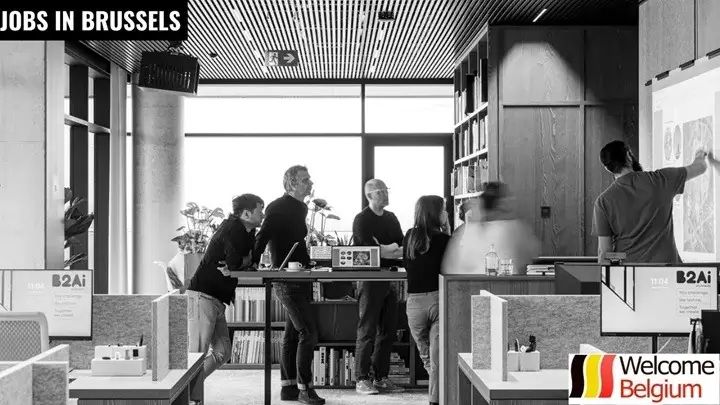The job market in Brussels is dynamic and diverse for locals and foreigners. The capital of Belgium attracts many international companies, NGOs and European institutions, creating a competitive market. However, jobs in Brussels require language skills and qualifications. In this article, we will analyze the job market and consider the main aspects of employment in this important business center of Europe.
Local and foreign job seekers in the labour market
Brussels is home to many international organisations, creating a unique situation on the labour market, where many positions require knowledge of several languages and experience of working in an international environment. While locals often have an advantage due to their knowledge of the country’s official languages (French and Dutch), foreigners who speak English and other international languages can also find attractive offers.
For successful employment it is important to consider:
- Language skills: Proficiency in at least one of the official languages of Belgium (French or Dutch) as well as English are criteria for many vacancies.
- Qualifications: Most high-paying jobs require a college degree and experience in a related field.
- Employers value candidates who are able to adapt to the multicultural environment of Brussels.
Brussels offers various employment opportunities for both locals and foreigners. However, successful employment is directly related to language skills and professional qualifications.
Important: In Brussels, more than 60% of workers are foreigners, making the city a true international centre of labour activity.
Salary levels and requirements for candidates
Salaries in Brussels vary depending on the industry, skill level and work experience. The city has a strong presence in sectors such as finance, IT, consulting, and public and international institutions, which creates different salary conditions. On average, salaries in Brussels are considered higher than in other parts of Belgium, especially in areas related to international activities.
Examples of salaries in Brussels:
- Financial analyst: from 3,500 to 5,500 euros per month.
- IT specialist: from 4,000 to 6,000 euros per month.
- Administrative assistant in an international company: from 2,800 to 4,500 euros per month.
The requirements for candidates include:
- Higher education in the relevant field.
- Work experience, especially in international companies.
- Intercultural communication skills.
High salaries in Brussels come with strict requirements for candidates, including higher education and language skills, making the city’s labor market highly competitive.
Interesting fact: Brussels is home to over 2,000 international companies, which significantly increases the average salary level in the city compared to the rest of Belgium.
How to get a job in Brussels: step-by-step instructions
Finding a job in Brussels is a process that requires careful preparation and knowledge of the local labor market. The capital of Belgium, thanks to international companies and European institutions, offers many opportunities for job seekers. However, competition is high, and for successful employment it is important to prepare a high-quality CV, cover letter and familiarize yourself with the requirements of employers. In this section, you will find step-by-step instructions that will help you organize the process of searching and finding a job in Brussels.
You can get a job in Brussels by following the instructions and preparing for all stages in advance. The employment process depends on your specialty and citizenship, but the main steps include.
- Preparing a resume and cover letter. It is important that they comply with European standards. The resume should be short and informative, and the cover letter should be tailored to the specific vacancy.
- Job search: Brussels has job search platforms such as Indeed, LinkedIn and specific sites for international vacancies (EURES).
- Apply: Select a few companies or positions that match your skills and submit your resume with a cover letter.
- Preparing for the interview: Interviews in Brussels are often conducted in several languages, so be prepared for questions in French, Dutch or English.
- Obtaining a work permit (for non-EU citizens) If you are not an EU citizen, you will need a work permit, which can be obtained after receiving an offer from an employer.
Following these steps will significantly increase your chances of successfully finding employment in Brussels. It is important to prepare for the process in advance and have the necessary documents.
Important: Most interviews in Brussels are bilingual, so knowing English and French or Dutch gives a significant advantage.
Ways to find a job in Brussels
In Brussels, you can look for a job in different ways, from traditional methods to using digital platforms and personal contacts. The variety of offers allows the job seeker to find something suitable for themselves, depending on their professional level and experience.
The main ways to find a job:
- Online platforms: Indeed, LinkedIn, Jobat and StepStone are popular job search sites.
- Careers in international companies. Vacancies are regularly posted on the websites of international organizations such as the European Commission and the UN.
- Recruitment agencies: Many agencies, such as Page Personnel and Hays, help with the placement of foreign specialists.
- Personal contacts, participation in professional conferences and exhibitions will help you find a job.
There are different methods to find a job in Brussels, from using online platforms to active networking. It is important to use several search channels to increase your chances.
Fun fact: Brussels hosts one of Europe’s largest job fairs for young professionals, making it much easier for students and recent graduates to find a job.






